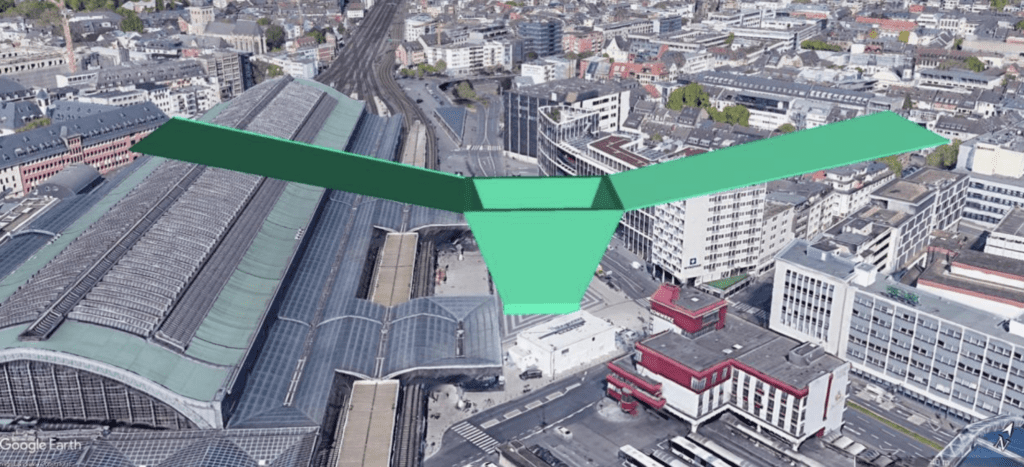
EASA recently published design specifications for vertiports in the EU. The above illustration depicts a potential vertiport design in a congested urban area based on standard parameters calculated from the area required for a VTOL to perform take-offs and landings. (Photo courtesy of EASA Prototype Technical Design Specifications for Vertiports, p. 74)
The European Union Aviation Safety Agency (EASA) recently published the world’s first vertiport design specifications. The document, titled “Prototype Technical Design Specifications for Vertiports,” provides technical guidance and best practices regarding the necessary ground infrastructure for future urban air mobility operations in Europe.
In developing these recommendations, EASA coordinated with leading vertiport companies and manufacturers of vertical take-off and landing (VTOL) aircraft. Two vertiport operators that were consulted are the Spanish multinational company Ferrovial and Skyports, provider of infrastructure solutions for UAM and cargo drone deliveries. EASA also consulted manufacturers including Airbus, ASD Group, Lilium, and Volocopter to inform their recommendations.
EASA’s next objective is to “develop a full regulatory framework for vertiport design and certification, operations, and oversight of vertiport operators in the context of a rulemaking task (RMT.230 Introduction of a regulatory framework for the operation of drones),” the agency told Avionics International in an emailed statement. This RMT will create a foundation for the global vertiport market that takes into account the broad range of stakeholders that play a part in urban air mobility (UAM).
A Notice of Proposed Amendment for the new regulatory framework will be published during the second half of 2023, and EASA expects to publish the Opinion for the Implementing Rules in the first half of 2024.

A diagram that shows geometry-based VTOL-capable aircraft stands (Photo courtesy of EASA Prototype Technical Design Specifications for Vertiports, p. 40)
According to the agency, “EASA guidance offers new and innovative solutions specifically for congested urban environments” and for designing vertiports that take into consideration the capability of performing vertical take-offs and landings. The representative from EASA highlighted one particular aspect of the recommendations that differs from today’s heliports—”the concept of a funnel-shaped area above the vertiport, defined as an obstacle-free volume. This concept is tailored to the operational capabilities of the new VTOL aircraft, which can perform landings and take-offs with a significant vertical segment.”
“Depending on the urban environment and on the performance of certain VTOL-capable aircraft, omnidirectional trajectories to vertiports will be also possible. Such approaches can more easily take account of environmental and noise restrictions and are therefore more suitable for an urban environment than conventional heliport operations, which are more constrained in the approaches that can be safely applied.”
EASA plans to recommend the Prototype Technical Design Specifications for Vertiports to the International Civil Aviation Organization (ICAO) for developing harmonized global standards for vertiport design. While developing the design specifications, EU member states, VTOL aircraft manufacturers, and industry experts confirmed that EASA’s latest guidance is applicable for numerous stakeholders in the EU, including urban planners.